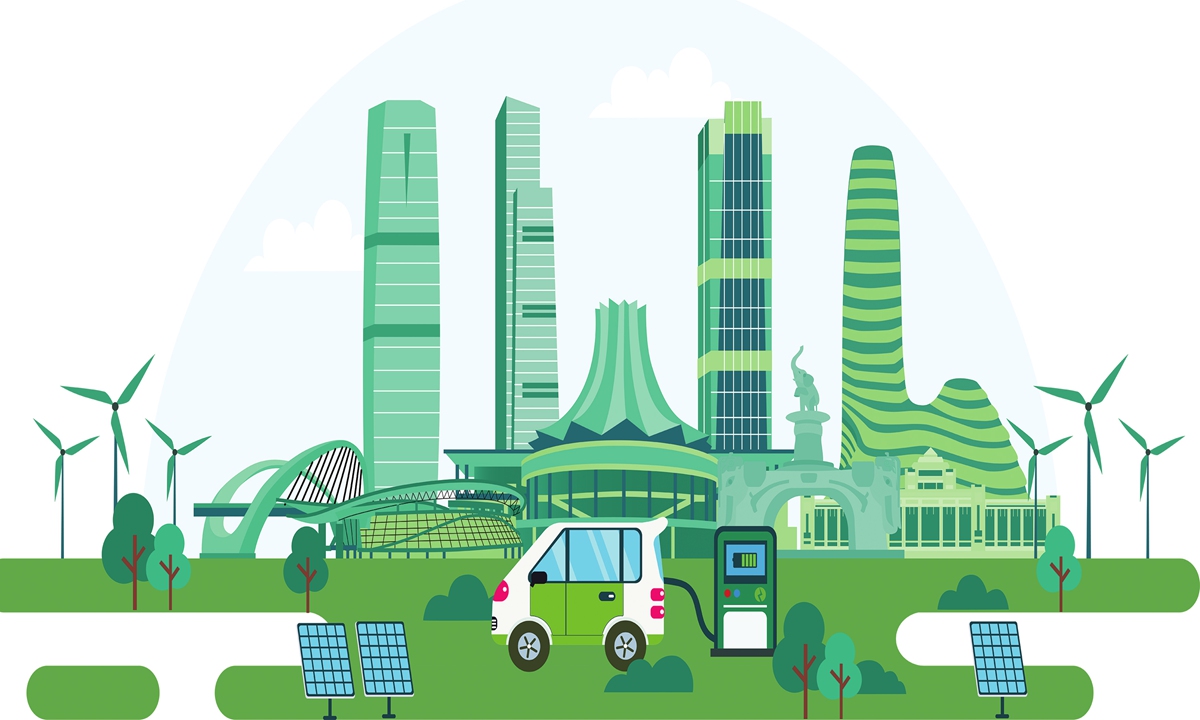
Photo: VCG
Editor's Note:The West does not want to live in a world where the foremost energy provider is China, so they're attempting to slow China down with initiatives like "overcapacity," Arnaud Bertrand (
Bertrand), a French entrepreneur and commentator on economics and geopolitics, told Global Times (
GT) reporter Li Aixin in a recent interview. The rhetoric is "akin to a fellow sprinter asking Usain Bolt to run less fast because he can't keep up, which is not exactly fair," Bertrand said.
GT: What do you think is "green overcapacity"? Does China have "overcapacity" in the green industry?
Bertrand: The official definition is "when an industry's production capabilities exceed the demand for its products, leading to inefficiencies and reduced profitability." The key metrics to assess if a country has "industrial overcapacity" is, first, capacity utilization rates - if you have overcapacity, it means you have a capacity that you don't use. On inventory levels, you have a lot of unsold goods. And on profit margins, if you produce too much, then in order to sell your products, you need to drop your prices or reduce your profit.
I have had a look at China for all three. The numbers simply don't back up the narrative at all. On capacity utilization rates, they've been pretty much constant in China for the past 10 years. China's industrial capacity utilization rate is 76 percent, and the US' is 78 percent, roughly the same ballpark. On inventory levels, there is no sign of growing stock levels. And on profit margins, China's industrial profits rose 10.2 percent in the first two months of the year. So Chinese industry is becoming more profitable, which is a sign that they are not selling goods at desperate prices in order to get rid of inventory.
The real issue here is, in fact, not overcapacity, but competitiveness. What is clear is that the competitiveness of Chinese companies is very high, especially in the solar panel industry and the electrical vehicle industry. The Chinese are so competitive that there is no way for American or European companies to compete. That's the real issue.
What US Treasury Secretary Janet Yellen and the Western leaders are afraid of is that if things keep going the way they are, China will eat everyone's lunch. This competitiveness is not due to unfair practices. It's not even due to cheap labor, which is not the case anymore in China. People are paid on par with eastern European countries more or less in China. It's due to the fact that China has an extremely efficient supply chain. If you want to build something, you can find everything to build it in China. That's a huge advantage which allows China to have cheaper prices than other countries. It is due to energy prices. For instance, for the production of solar panels, energy prices in Germany are 235 percent more expensive than in China. So at the end of the day that has a big impact on final prices. It is also due to innovation. China has become an innovation powerhouse. It innovates in ways that make its products cheaper.
So the threat of China's industrial overcapacity is a buzzword that actually means China is simply too competitive. What Yellen is truly asking of China is akin to a fellow sprinter asking Usain Bolt to run less fast because he can't keep up, which is not exactly fair.

Arnaud Bertrand Photo: Courtesy of Bertrand
GT: If the US government keeps excluding cost-effective Chinese clean products and maintains economic protectionism, what impact will this have?
Bertrand: It will have a huge impact on the global energy transition. That's common sense. China is the only manufacturing superpower in the world. If you somehow put in place a system where they are not allowed to manufacture and export products needed for that energy transition, it will dramatically slow it down. It's just pure logic, and it's almost criminal to do this, because it's the main global challenge that we face as a species.
GT: The US passed the Inflation Reduction Act which provides nearly $370 billion to promote clean sectors. Other Western countries are also scaling up green subsidies. How do you view the hypocrisy in criticizing China for subsidizing electric vehicles while they are doing the same?
Bertrand: There is a contradiction, but only if you take the rhetoric at face value. If you take a step back, there is zero contradiction: the "China overcapacity" rhetoric is in fact because the US wants to develop its own clean energy sector, and so they need a narrative to justify hostile measures against China's sector.
What I think happened is that China really understood before anyone else the importance of the green industry. They started working on it almost 20 years ago which gave them a huge advantage, so much so that they now completely dominate it. Twenty years later, the US wakes up and realizes that the world of tomorrow will be powered by clean energy and they're pretty much nowhere to be seen in the industry. They obviously don't want to live in a world where the world's foremost energy provider, including to themselves, is China. And so they're making huge efforts to catch up and, at the same time, attempt to slow China down with initiatives like this "overcapacity" rhetoric.
GT: According US logic, could we say the US' high-end chip industry also has a problem of "overcapacity"?
Bertrand: That's a good one! Yes, according to US logic, that would be the case. But what I like about China, and the key behind its success, is precisely that it doesn't work according to US logic. At the end of the day, I think that China keeps in mind that its own behavior is also a message to the world, and they want to be able to say "everyone can see how the US treats China and how China treats the US and decide for themselves who's the mature power in the relationship".
In the long run, it plays to China's advantage because, behind all the day-to-day, China and the US are in a larger confrontation to define the future of the world order and the world will undoubtedly want an order that is fair and just. So the more the US acts like it does in stunningly hypocritical and unjust ways, the more repulsive it becomes in the eyes of the world and the more it loses its legitimacy to dictate the rules.
GT: German Chancellor Olaf Scholz said during his China visit in April that he was impressed by the cooperation between German and Chinese enterprises in the field of hydrogen technology. As you mentioned, China and France also have cooperative programs in nuclear power plant operations. What impact will this green cooperation between China and other countries bring about?
Bertrand: I'm a firm believer that when it comes to global challenges, the more we cooperate globally to tackle them, the better. The worst thing that can happen with regards to mitigating climate change or tackling any global issue is a replay of what we saw during COVID, which was a politicization of the issue which led to countries fighting each other rather than cooperating to fight the virus together. So as a matter of principle we should applaud any initiative that drives toward unity and cooperation to tackle climate change, rather than sow division.
Also, looking at it strategically, I think it is important that European countries see China as a partner, as opposed to only a competitor or only a supplier. It goes back to
my analogy of the 3 rings of power. China benefits from Europe playing a balancing role, as opposed to being synonymous with the US' "ring". And Europe will of course be keener to be its own "ring" if it sees itself as a partner of the two other "rings", not just the US.
GT: Do you or your family or friends use Chinese EVs or other renewable energy products?
Bertrand: We don't use them. That's another irony with regards to the overcapacity rhetoric. If you look at France today where my family is, you can barely see any Chinese cars on the road. I checked BYD, China's biggest car company. It sold fewer than 16,000 cars in Europe last year. In comparison, Toyota sold 1 million; Nissan sold over 340,000; Hyundai, the South Korean car company, sold more than 1 million.
Listening to the media with the overcapacity narrative, you would have the feeling that the West is getting absolutely flooded with Chinese cars. But actually, that's not true, that's not the reality at all.
There is a fear that if China starts exporting more, then local car companies in Western countries would face very tough competition. It's more driven by this hypothetical fear of the future than reality.
GT: In the face of the US government and media's smear campaign, do you have any suggestions on how to better promote the truth?
Bertrand: I think the best way is to simply invite as many people as possible to come to China and to see the country with their own eyes. The best way for people to understand China is to go there and see for themselves. I think that people-to-people exchanges and opening-up is the best way to counter the propaganda in the West.





